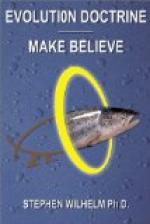Many of the facts demonstrating this connection are matters of common knowledge. In deep and dreamless sleep the essential tissues of the brain are inactive, and in correspondence with the cessation of material events the thinking individual actually ceases to exist for a time. Any one who has ever fainted is subsequently aware of the break in the current of human consciousness when the blood does not fully supply the brain and this organ ceases to function properly; a severe blow upon the head likewise interrupts the normal physical processes, and at the same time the mind is correspondingly affected. Again, a progressive alteration of the brain as the result of diseased growth causes the mind to grow dim and incapable. Sometimes infants are born which are so deficient mentally as to be idiots, and an examination of the brain in such a case reveals certain correlated defects in physical organization. These and similar facts form the basis for the dictum that the development and evolution of the brain mean the growth and evolution of human intellect.
The further question as to the nature of the connection is interesting, but it relates to matters of far less consequence to the naturalist than the central fact of the invariable relation which does exist. Throughout the centuries many philosophers and naturalists of numerous peoples have endeavored to explain the connection in question in ways that have been largely determined by the changing states of knowledge of various periods, as well as by differences in individual temperament. Three general conceptions have been developed: first, that the material and mental phenomena interact; second, that they are parallel; and third, that they are one.
According to the first view, the individual thoughts and feelings forming elements in the chain of consecutive consciousness are affected by the events in the material physiology of the brain as a physical structure; the latter in turn react upon the psychical or mental elements. Thus there would be two complete series of phenomena, which are interdependent and interacting at all times, although each would be in itself a complete chain of elements.




